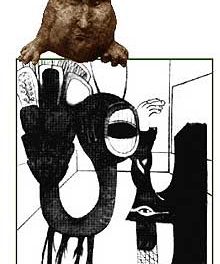Formerly thought to be an easy employment haven, young people from around the world descended upon the country, seeking their fortunes while importing diversity and a refreshing spark to a country that had been stifled by years of communist oppression.
Now the decades-old system of allowing visitors to play accidental tourist – finding a job and establishing residency in the Czech Republic – has drawn to a close.
Now, those wishing to seek long-term visas must apply from embassies abroad, which can prove a costly endeavor involving a lot of waiting.
With this new regulation, part of the incipient magic that made the Czech Republic such a sensation during the nineties is vanishing into thin air. Initially proposed in April, the government had nearly nine months to perfect the complicated new law. However, with the constant infighting and legislative gridlock of the Opposition Agreement, Parliament didn’t pass the bill until November 30 with Havel signing it into law mid-December.
A printed version of the new regulations only became available just before Christmas, giving the Foreigner Police a meager few days to overhaul its entire system based on the murky, new regulations. It’s been a long time now since this happeend, yet the process is as perplexing as ever, with denials for no apparent reason.
It’s perplexing to envision why a law that will ultimately change the face of the Czech Republic was pushed through so quickly and without more thought and discussion in the first place. Part of the reason was to placate the bulldogs of the European Union after they handed the Czech Republic a bad report card. Embarrassed by that setback, the government brought to the forefront their mission to meet EU immigration standards back in 2000.
However, a poll by the STEM agency reported that 38 percent of Czechs don’t even favor joining the European Union and only 45 percent of those surveyed said that they had a general idea of the conditions involved in becoming a EU member state. Only ten percent claimed to have enough information to know what EU integration means ultimately for the Czech Republic. Klaus’s reluctance to sign the Lisbon Treaty is just a symptom of the fear that loss of soveriegnty will mean the end of their primacy.
For a country that doesn’t full-heartedly embrace European Union membership, the stringent laws seem forced and poorly planned. But, there may have been another factor besides EU compliance that drove career-minded politicians to blaze forward – xenophobia.
One only has to look at the new border policies to see the blatant discrimination of the new regulations.
The law states that all foreigners entering the country must fill out forms (available only in Czech), provide photographs, show proof of health insurance, accommodation and funds to cover their stay in the Czech Republic – a policy stricter than anywhere else in the world.
However, all countries have been divided into two categories: favored and non-favored.
Citizens from non-favored nations, such as the Ukraine and Russia, must present all of the necessary documents, while those hailing from the US or the EU are free from this burden, as the police have been instructed not to enforce the law against the latter. This discriminatory practice has caused massive lines on the nation’s eastern borders since it started.
Using the recent law as impetus to execute deportation, Interior Minister Vaclav Grulich had announced a frightening plan to ship illegal immigrants, especially Ukrainians, back to their native countries.
“Foreigners who reside here illegally, don’t have work permits, and damage our economy will be the ones sent home,” he told Mlada fronta Dnes. He didn’t mention the positive impact that illegal aliens have had on the economy by performing jobs that many Czechs consider beneath them.
The country’s lax residency laws have actually brought considerable prosperity to much of the Czech Republic, especially its capital city.
Facing stringent residency and work permit restrictions throughout Western Europe, a barrage of young Americans, rumored to swell over 40,000 at tone point, descended upon Prague alone, bringing their pocket books, English teaching, and entrepreneurial skills to the country’s fledgling market economy.
Since 1989 nearly 100 percent of Americans who established residency in the Czech Republic did so inside the country’s borders. Where will the language schools and up-start software companies pool their talent now that their main source of employees has been eliminated?
Many will most likely hire illegally, while some may choose to set up camp further East, place like Romania, Croatia and Macedonia, where there will be fewer restrictions and they can still hire qualified candidates who straggle into town.
As the limits of the European Union roll East, more and more rules will circumscribe the nations within the former Soviet block. Czechs will make more money, but they’ll lose their koruna; and they will have to bow down to Western bigwigs telling them who they can buy their beef from, what regions are allowed to make certain wines and cheeses, and where the country can sell its prized Staropramen.
In a sense, a culture that’s notorious for its xenophobic nature will ultimately sacrifice its autonomy to a West that barely shrugged when it handed the nation over to Hitler.
And Prague, once illuminated as a city of youthful inspiration and uncountable adventures, will become just another stop on a speed train racing from Lisbon to Moscow.




